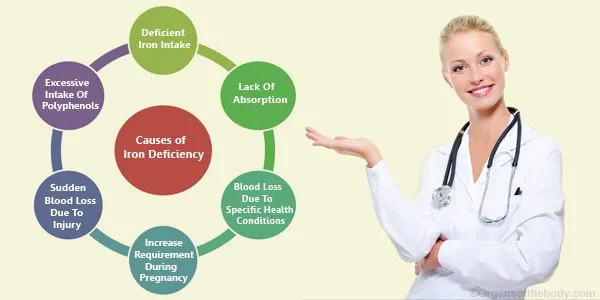What Causes Iron Deficiency in Males & Females?
Iron Deficiency – the Major Concerns
Iron is an extremely important mineral for the body. It performs various functions, the most important of which is to make red blood cells. Red blood cells are an extremely significant element of the blood and perform the job of carrying oxygen to different parts of the body. This task is performed by a protein which is an integral part of red blood cells – haemoglobin. A lack of iron in the body, therefore, directly impacts the formation of blood and the hemoglobin levels decline.
This consequently affects the overall performance of an individual’s body and brain function. On the other hand, Iron also plays a role in the formation of myoglobin – a protein which supplies oxygen to muscles specifically and, therefore, helps in maintaining muscle health. Similarly, iron also plays a major role in forming different enzymes which help the body perform various functions like digestion. It is for this reason that the mineral is extremely important for the proper functioning of the human body. A deficiency can lead to several significant medical issues.

Iron deficiency in individuals can be caused by more than one reason. Let’s have a detailed look at what causes iron deficiency.
Causes of Iron Deficiency
The major causes of iron deficiency include the following.
Deficient Iron Intake
One of the major reasons causing iron deficiency is simply the insufficient intake of iron through diet. Although this can be easily catered through a medical practitioner’s prescription of iron supplements, it is very important to introduce natural sources of iron through which an individual’s food intake for long term benefits. Red meat, fish, poultry, spinach, oats and whole grain are some rich sources of the mineral.
Make sure to introduce the RDA (Required daily amount) of iron in your diet according to an individual’s diet, age, gender and physical condition. The National Institute of health, United States has also stated figures of the exact amount of iron necessary for individuals. Failing to intake this recommended level of the important mineral can render individuals iron deficient, leading inevitably to the related medical conditions.
Men: between 19.3 and 20.5 milligrams per day.
Women: between 17 and 18.9 milligrams per day.
Pregnant women: between 27 to 30 milligrams per day.
Children (2 to 11 years): between 13 and 15.1 milligrams per day.
Teenagers (12 to 19 years): 16.3 milligrams per day.
Lack of Absorption
In some cases, iron deficiency occurs or persists even when the individual is taking the recommended daily dose of iron. This condition is due to the fact that, in certain cases, the body is unable to absorb iron from food as efficiently. Some of the reasons why some individuals fail to absorb iron are explained below.
- If an individual takes excessive antacids, it is likely to decrease the stomach acid and consequently the absorbed iron.
- Eating more vegetables than meat will also result in malabsorption of the mineral as the body absorbs iron from meat, poultry and fish three times more efficiently than it does from plant sources, such as vegetables.
- Deficiency of vitamin C in an individual’s body can lead to lack of proper absorption of iron. Vitamin C, in fact, improves the absorption of iron from non-meat sources.
- The excessive intake of Polyphenols, Calcium and Phytates - found in green tea, black tea, coffee and whole grains - can decrease the absorption of iron from non-meat sources like spinach and fortified cereals.
Blood Loss due to Specific Health Conditions
In some specific health conditions, the body loses blood. This in turn leads to an iron deficiency in the body. Stomach ulcers, gastrointestinal cancer, gastrointestinal bleeding and chronic kidney disease are a few of the biggest medical conditions which lead to a deficiency of the important mineral. Individuals suffering from such conditions are often treated with direct transfusion of iron in the body in order to make up for the huge deficit.
Increase Requirement During Pregnancy
In pregnancy, the body’s requirement of iron increases in order to fulfill the needs of the developing embryo. It is not only important for the proper growth of the baby, but is equally significant for maintaining the health of the mother. This increase in the body’s requirement often results in iron deficiency if reasons like inadequate intake or poor absorption fail to fulfill this requirement. Some women need supplements during pregnancy in order to cope with this increased need while others just need to add a few iron rich food items in their diet.
Sudden Blood Loss
Sudden blood loss may occur due to an accident leading to severe physical or internal injury. Other causes include similar bleeding situation, such as heavy menstruation or blood loss during a surgery procedure. On the other hand, regular blood donation also results in the loss of blood from the body. These conditions can cause iron deficiency in individuals if the blood loss is not made up for through transfusions or supplements as recommended by the physician.
Prevention and Treatment of Iron Deficiency
In the light of the aforementioned importance of iron in the body and its impact on the daily life, it is imperative for us to make sure that our iron intake is sufficient for our body to function properly. Therefore, in order to avoid the deficiency of iron and its related issues, the following measures should be taken into account.
- Take a healthy diet and make sure you include iron rich foods like poultry in the diet for the whole family.
- In severe conditions of deficiency or where the diet is not balanced enough, iron supplements should be used after consulting with a doctor.


